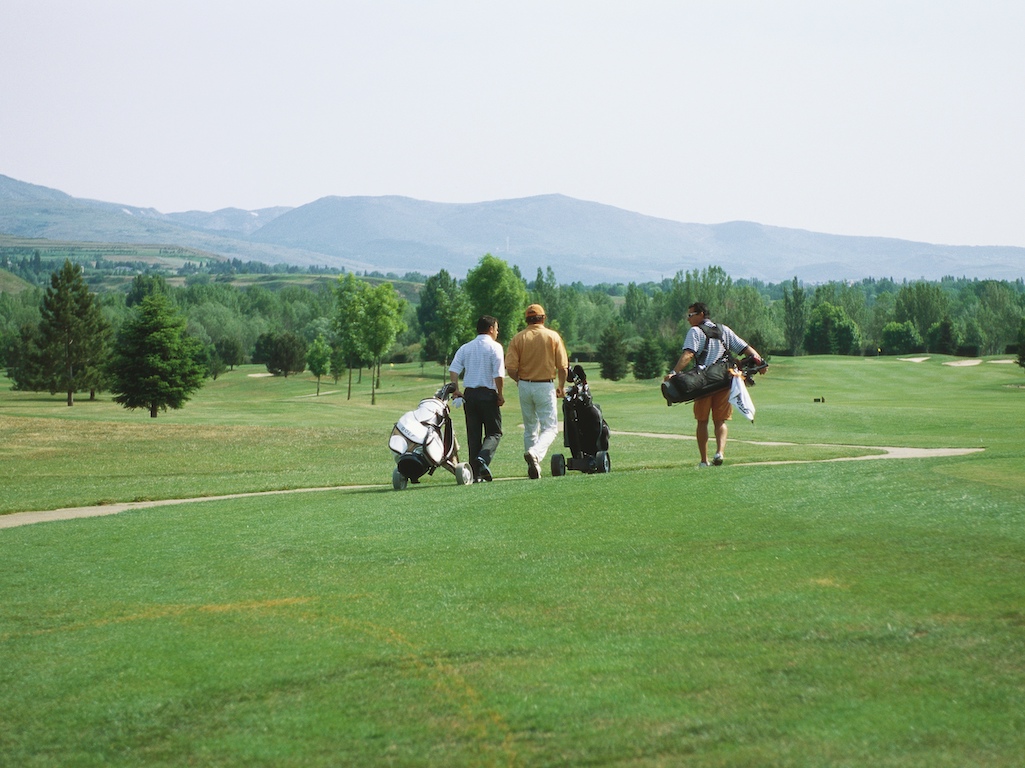Opinion & Analysis
It isn’t snobby to enjoy golf how you want to

Being particular about something you enjoy because your resources are limited and you want to maximize them doesn’t make you a snob—it makes you an educated participant.
Golf has always struggled with the image of being snobby, and it’s easy to understand the basis of that stereotype: private clubs, the perceived cost associated with the game, the rules, proper etiquette, and dress codes all leave people with the impression that golf is “not for them.” I mean, how many movie bad guys are shown hitting putts into a glass in their office? Golf is used as a negative trope.
Recently, the idea of snobbery in golf has shifted to an internal one between groups firmly holding their ground on a point of view.
- walkers vs. cart riders
- architecture junkies vs. lush fairway seekers
- bag tag Barrys vs. hidden gem travelers
- persimmon & blades vs. modern gear
- music vs. NO Music on the course
The list could go on…
Any one of these discussions usually ends up in finger-pointing and placing unfounded blame on the other group for not being smart enough to understand the other’s point of view, or not being “with it,” or “woke.” But what I believe we need to realize is golf as a whole is better when everyone enjoys it the way they want to, as long as it doesn’t impede on someone else’s ability to also enjoy the game—except slow play…nobody likes slow play.
I, for one, am firmly on team pro-walkers, persimmon, music, and architecture, but it doesn’t mean I’m against the others, it’s just how I often choose to enjoy my time when I play. You can make great arguments on both sides of these issues, and even with my stated position, I’m willing to counter my own opinions
- For example, having worked with people with disabilities in past work experience, I understand that mobility is a huge struggle for a lot of people. As the population ages, I’d much rather see someone out playing in a cart than not playing at all, and when I have to, or sometimes even when I don’t, I still enjoy taking a cart, especially when testing gear and carrying upwards of 20 clubs.
- Course design is more important to me than overall conditioning, but if you are someone that only gets the opportunity to play every couple of weeks, I totally understand why you would want to play at a lush green course. My one and only counter-argument will be that as water use becomes more of an issue these traditional ideas might need to shift in certain geographic locations, but beyond that, play golf where you will have the most fun.
- Persimmon to me is a way to remind myself how far we’ve come. It’s way better and more fun on particular courses from a classical era but so is mashing a drive with a 460cc driver. I love hunting for an old Cleveland Classic wood as much as I like finding out my new 3-wood is eight yards longer than my previous one. Technology helps everyone, and if you’d rather use modern gear vs. older stuff, I’m right there with you. Hitting it farther and being able to play your misses is a lot less frustrating, kinda like driving with an automatic transmission compared to a standard—something I can do but never really gotten the hang of. It’s just a different way to experience the same stretch of highway.
At the end of the day, golf is what you make it, whether it be a trip to a bucket list course walking with a caddie or a few beers in a cart, mashing drives at your local muni. Regardless of how “woke” you think you are or how much you just want to go out and just hit some shots, as golfers I think we need to accept that there is more than one way to play this game, and that’s truly what makes it great.
Opinion & Analysis
The 2 primary challenges golf equipment companies face

As the editor-in-chief of this website and an observer of the GolfWRX forums and other online golf equipment discourse for over a decade, I’m pretty well attuned to the grunts and grumbles of a significant portion of the golf equipment purchasing spectrum. And before you accuse me of lording above all in some digital ivory tower, I’d like to offer that I worked at golf courses (public and private) for years prior to picking up my pen, so I’m well-versed in the non-degenerate golf equipment consumers out there. I touched (green)grass (retail)!
Complaints about the ills of and related to the OEMs usually follow some version of: Product cycles are too short for real innovation, tour equipment isn’t the same as retail (which is largely not true, by the way), too much is invested in marketing and not enough in R&D, top staffer X hasn’t even put the new driver in play, so it’s obviously not superior to the previous generation, prices are too high, and on and on.
Without digging into the merits of any of these claims, which I believe are mostly red herrings, I’d like to bring into view of our rangefinder what I believe to be the two primary difficulties golf equipment companies face.
One: As Terry Koehler, back when he was the CEO of Ben Hogan, told me at the time of the Ft Worth irons launch, if you can’t regularly hit the golf ball in a coin-sized area in the middle of the face, there’s not a ton that iron technology can do for you. Now, this is less true now with respect to irons than when he said it, and is less and less true by degrees as the clubs get larger (utilities, fairways, hybrids, drivers), but there remains a great deal of golf equipment truth in that statement. Think about it — which is to say, in TL;DR fashion, get lessons from a qualified instructor who will teach you about the fundamentals of repeatable impact and how the golf swing works, not just offer band-aid fixes. If you can’t repeatably deliver the golf club to the golf ball in something resembling the manner it was designed for, how can you expect to be getting the most out of the club — put another way, the maximum value from your investment?
Similarly, game improvement equipment can only improve your game if you game it. In other words, get fit for the clubs you ought to be playing rather than filling the bag with the ones you wish you could hit or used to be able to hit. Of course, don’t do this if you don’t care about performance and just want to hit a forged blade while playing off an 18 handicap. That’s absolutely fine. There were plenty of members in clubs back in the day playing Hogan Apex or Mizuno MP-32 irons who had no business doing so from a ballstriking standpoint, but they enjoyed their look, feel, and complementary qualities to their Gatsby hats and cashmere sweaters. Do what brings you a measure of joy in this maddening game.
Now, the second issue. This is not a plea for non-conforming equipment; rather, it is a statement of fact. USGA/R&A limits on every facet of golf equipment are detrimental to golf equipment manufacturers. Sure, you know this, but do you think about it as it applies to almost every element of equipment? A 500cc driver would be inherently more forgiving than a 460cc, as one with a COR measurement in excess of 0.83. 50-inch shafts. Box grooves. And on and on.
Would fewer regulations be objectively bad for the game? Would this erode its soul? Fortunately, that’s beside the point of this exercise, which is merely to point out the facts. The fact, in this case, is that equipment restrictions and regulations are the slaughterbench of an abundance of innovation in the golf equipment space. Is this for the best? Well, now I’ve asked the question twice and might as well give a partial response, I guess my answer to that would be, “It depends on what type of golf you’re playing and who you’re playing it with.”
For my part, I don’t mind embarrassing myself with vintage blades and persimmons chasing after the quasi-spiritual elevation of a well-struck shot, but that’s just me. Plenty of folks don’t give a damn if their grooves are conforming. Plenty of folks think the folks in Liberty Corner ought to add a prison to the museum for such offences. And those are just a few of the considerations for the amateur game — which doesn’t get inside the gallery ropes of the pro game…
Different strokes in the game of golf, in my humble opinion.
Anyway, I believe equipment company engineers are genuinely trying to build better equipment year over year. The marketing departments are trying to find ways to make this equipment appeal to the broadest segment of the golf market possible. All of this against (1) the backdrop of — at least for now — firm product cycles. And golfers who, with their ~15 average handicap (men), for the most part, are not striping the golf ball like Tiger in his prime and seem to have less and less time year over year to practice and improve. (2) Regulations that massively restrict what they’re able to do…
That’s the landscape as I see it and the real headwinds for golf equipment companies. No doubt, there’s more I haven’t considered, but I think the previous is a better — and better faith — point of departure when formulating any serious commentary on the golf equipment world than some of the more cynical and conspiratorial takes I hear.
Agree? Disagree? Think I’m worthy of an Adam Hadwin-esque security guard tackle? Let me know in the comments.
@golfoncbs The infamous Adam Hadwin tackle ? #golf #fyp #canada #pgatour #adamhadwin ? Ghibli-style nostalgic waltz – MaSssuguMusic
Podcasts
Fore Love of Golf: Introducing a new club concept

Episode #16 brings us Cliff McKinney. Cliff is the founder of Old Charlie Golf Club, a new club, and concept, to be built in the Florida panhandle. The model is quite interesting and aims to make great, private golf more affordable. We hope you enjoy the show!
Opinion & Analysis
On Scottie Scheffler wondering ‘What’s the point of winning?’

Last week, I came across a reel from BBC Sport on Instagram featuring Scottie Scheffler speaking to the media ahead of The Open at Royal Portrush. In it, he shared that he often wonders what the point is of wanting to win tournaments so badly — especially when he knows, deep down, that it doesn’t lead to a truly fulfilling life.
View this post on Instagram
“Is it great to be able to win tournaments and to accomplish the things I have in the game of golf? Yeah, it brings tears to my eyes just to think about it because I’ve literally worked my entire life to be good at this sport,” Scheffler said. “To have that kind of sense of accomplishment, I think, is a pretty cool feeling. To get to live out your dreams is very special, but at the end of the day, I’m not out here to inspire the next generation of golfers. I’m not out here to inspire someone to be the best player in the world, because what’s the point?”
Ironically — or perhaps perfectly — he went on to win the claret jug.
That question — what’s the point of winning? — cuts straight to the heart of the human journey.
As someone who’s spent over two decades in the trenches of professional golf, and in deep study of the mental, emotional, and spiritual dimensions of the game, I see Scottie’s inner conflict as a sign of soul evolution in motion.
I came to golf late. I wasn’t a junior standout or college All-American. At 27, I left a steady corporate job to see if I could be on the PGA Tour starting as a 14-handicap, average-length hitter. Over the years, my journey has been defined less by trophies and more by the relentless effort to navigate the deeply inequitable and gated system of professional golf — an effort that ultimately turned inward and helped me evolve as both a golfer and a person.
One perspective that helped me make sense of this inner dissonance around competition and our culture’s tendency to overvalue winning is the idea of soul evolution.
The University of Virginia’s Division of Perceptual Studies has done extensive research on reincarnation, and Netflix’s Surviving Death (Episode 6) explores the topic, too. Whether you take it literally or metaphorically, the idea that we’re on a long arc of growth — from beginner to sage elder — offers a profound perspective.
If you accept the premise literally, then terms like “young soul” and “old soul” start to hold meaning. However, even if we set the word “soul” aside, it’s easy to see that different levels of life experience produce different worldviews.
Newer souls — or people in earlier stages of their development — may be curious and kind but still lack discernment or depth. There is a naivety, and they don’t yet question as deeply, tending to see things in black and white, partly because certainty feels safer than confronting the unknown.
As we gain more experience, we begin to experiment. We test limits. We chase extreme external goals — sometimes at the expense of health, relationships, or inner peace — still operating from hunger, ambition, and the fragility of the ego.
It’s a necessary stage, but often a turbulent and unfulfilling one.
David Duval fell off the map after reaching World No. 1. Bubba Watson had his own “Is this it?” moment with his caddie, Ted Scott, after winning the Masters.
In Aaron Rodgers: Enigma, reflecting on his 2011 Super Bowl win, Rodgers said:
“Now I’ve accomplished the only thing that I really, really wanted to do in my life. Now what? I was like, ‘Did I aim at the wrong thing? Did I spend too much time thinking about stuff that ultimately doesn’t give you true happiness?’”
Jim Carrey once said, “I think everybody should get rich and famous and do everything they ever dreamed of so they can see that it’s not the answer.”
Eventually, though, something shifts.
We begin to see in shades of gray. Winning, dominating, accumulating—these pursuits lose their shine. The rewards feel more fleeting. Living in a constant state of fight-or-flight makes us feel alive, yes, but not happy and joyful.
Compassion begins to replace ambition. Love, presence, and gratitude become more fulfilling than status, profits, or trophies. We crave balance over burnout. Collaboration over competition. Meaning over metrics.
Interestingly, if we zoom out, we can apply this same model to nations and cultures. Countries, like people, have a collective “soul stage” made up of the individuals within them.
Take the United States, for example. I’d place it as a mid-level soul: highly competitive and deeply driven, but still learning emotional maturity. Still uncomfortable with nuance. Still believing that more is always better. Despite its global wins, the U.S. currently ranks just 23rd in happiness (as of 2025). You might liken it to a gifted teenager—bold, eager, and ambitious, but angsty and still figuring out how to live well and in balance. As much as a parent wants to protect their child, sometimes the child has to make their own mistakes to truly grow.
So when Scottie Scheffler wonders what the point of winning is, I don’t see someone losing strength.
I see someone evolving.
He’s beginning to look beyond the leaderboard. Beyond metrics of success that carry a lower vibration. And yet, in a poetic twist, Scheffler did go on to win The Open. But that only reinforces the point: even at the pinnacle, the question remains. And if more of us in the golf and sports world — and in U.S. culture at large — started asking similar questions, we might discover that the more meaningful trophy isn’t about accumulating or beating others at all costs.
It’s about awakening and evolving to something more than winning could ever promise.




















#1KuchFan
Nov 4, 2019 at 9:15 am
America needs carts to tote all the hippos around. That’s just a fact.
Mercedes
Nov 4, 2019 at 10:04 am
Winning snob comment
Mike Grove
Nov 3, 2019 at 6:30 am
I do not like cart golf. Walking for me is a part of the game that I have loved for 50+ years. I have a friend who moved south years ago but comes back to Maine every summer, and he rides so I ride. Once he said, “Do you remember when we couldn’t afford to ride?” My response was that I always hated riding. It interferes with actually playing the game and interaction within the group. Walking down a fairway with friends is a wonderful memory. I no longer carry but will keep walking until I can’t – then I will stop playing. Yes, after all these decades I still play blades…
Tackling Dummy
Nov 3, 2019 at 5:12 pm
I like walking as well. It is a much better experience on the golf course and you are more immersed in the nature of the golf course. Not to mention it is way better to get the exercise.
Fritznw
Nov 4, 2019 at 4:21 pm
So you will stop playing when you can’t walk vs riding in a cart. I can’t understand that. I’m 53 and have bad osteoarthritis in both knees, I can’t walk a flat course without pain and swelling at the end of the round. I’ll proudly take a cart every time if it means I still get to play. I won’t quit until I’m 6 feet under.
larrybud
Nov 3, 2019 at 5:45 am
Music affects other players. The other stuff doesn’t. Simple as that.
Dennis
Nov 4, 2019 at 2:43 am
Agree!
Scott
Nov 7, 2019 at 2:47 pm
100% agree. I have never heard any music on a course, for any length of time, that doesn’t become distracting. And when the people playing it roll up on me, it is very disrespectful.
I love music. I have been in a band for most of my life, but there is a time and place for everything.
Expat
Nov 2, 2019 at 1:07 am
I don’t care if someone uses a cart, but the game should be based around the walker first. Leave the US, and carts are the exception.
As they should be. They are an assistive mechanism.
Rich Douglas
Nov 1, 2019 at 11:31 pm
I’m fine with modern equipment. Most golfers can hit it anyway; they can use all the help they can get.
Music? Shut it off or listen to earplugs.
Course conditions? I’ll take an emphasis on design and acceptable conditions. But a good design doesn’t do any good if you don’t get a fair lie for a good shot, can’t get out of the bunkers, etc. A little of both, please.
I’d rather walk, but if the course is wide open I’ll take a cart and speed through. I can play in less than 2 hours that way. If not, I’d prefer to walk. Used to carry, but I trolley it nowadays.
I really don’t care about your bag tag from Torrey Pines. I used to play it for fifteen bucks, but I don’t need to show you a tag. Hidden gems? Love ’em.
Iknowdonkeys
Nov 1, 2019 at 10:33 pm
Matt Kuchar sucks big donkey
Matt Kuchar
Nov 2, 2019 at 8:58 pm
But your mom does it for free!!
shadid goldston
Nov 4, 2019 at 1:25 pm
Kuchar for President!
bobarino
Nov 1, 2019 at 7:17 pm
Music? Wear earbuds. If you play music at a course – or a driving range for that matter – that others can hear when it’s pretty evident that: (a) the vast majority of players aren’t taking music to the course; and (b) you’re presuming that others would want to listen to YOUR music, you MIGHT be a self-centered narcissist. Your solution: Get a swing simulator and play in your garage.
“Woke” OMFG gimme a break…
Nack Jicklaus
Nov 2, 2019 at 8:07 am
I expect not to have to listen to someone else’s annoying music when I go to a golf course and pay good money to do so. When did that become a “thing” anyway? The older I get the more quiet I want I guess…
Mad-Mex
Nov 2, 2019 at 8:56 pm
I can only imagine if I took a speaker and played some Mariachi music LOUD what would happen? I agree with you guys, earbuds if you want to hear music…
Tackling Dummy
Nov 3, 2019 at 5:15 pm
I agree. If you want to listen to music use earbuds. Don’t play music that affects other people’s play on the course.
Jeremy
Nov 1, 2019 at 6:47 pm
“Woke” seems like a huge stretch to be using in the context of this golf article … at least by it’s normal definition.
Woke: alert to injustice in society, especially racism
Dave
Nov 1, 2019 at 6:15 pm
Hey, Ryan, any opinion on modern balls that play nice with persimmon?
Ryan Barath
Nov 1, 2019 at 9:07 pm
The Wilson Staff Duo Professional is a Low Compression urethane that a lot of people like to use.
I generally use the Titleist AVX, but I would say try whatever your current ball is and then experiment from there.
ChipNRun
Nov 1, 2019 at 3:26 pm
I always find the “walking only” tribe to be interesting. Many courses mandate motorized golf carts, so what choice do golfers have? Will the walkers only skip golf rather than ride?
Also, the increased number of residential development clubs means it can be 300 yards from the No. 3 green to No. 4 tee. Everybody needs a home along the fairway…
Many of the residential developments have morphed into semi-private golf clubs: A core membership, a group that pays for a $500 card and golf for $X per round, and a good number of walk-ons with no real membership connection. Despite the fizzle of not becoming an upscale club, you still have 300 yards to walk from prior green to next tee.
The older gentlemen I sometimes play with are above 70 years of age, and most couldn’t play if they had to walk up and down all the hills. My wife has knee trouble, and nine holes – while riding in a cart – is all she can handle.
One of the telling remarks came from a very fit 40-something who trains for and runs in 10K races (about 7 miles in length). When I asked if he ever walks, he said no. For him golf is a separate fun activity, and he has a separate workout for his running.
Louis Christopher
Nov 1, 2019 at 11:35 pm
In mountainous areas or at modern monstrosities with cartoonishly long walks from green to tee, sure, take a cart. But in the Chicago area as well as any other state that was flattened out by glaciers, 90% of courses are walkable. Carts don’t really speed up play at these courses anyway because most people who take carts – at least in my 30+ years of playing the game – zoom all over the place chasing wayward shots and rarely hit greens. The amount of carts I play through every year as a walker is comical.
MT
Nov 1, 2019 at 2:39 pm
Hell, I’ll play with anyone. Simple as that.
Donald Ross
Nov 4, 2019 at 7:25 am
Atta boy